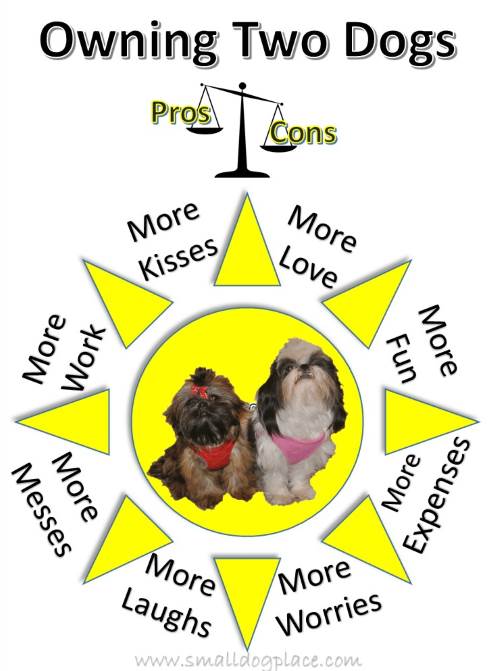Adding that Second Dog?
The Good, The Bad, The Smelly...
Are you thinking about bringing a second dog into your household? It would seem that it is an easy question, after all, what is one more pup?
On the other hand, the answer may be more difficult than you think. To add to that thought, perhaps you are already a two dog family and want a third? Just how hard could that be?
The joys of owning more than one dog can be incredible. There will always be double the puppy kisses, double the love, double the fun and so forth.
However, with all that comes extra expenses for food, veterinary care, grooming, boarding, bedding and so forth. Here are five lifestyle questions to consider before saying yes to those irresistible big eyes and happy wagging tail that is waiting to join your family.
Five Questions to Ask Yourself Before Getting a Second Dog
- Do you have the financial means to provide for a second dog?
Sure some expenses can be shared such as toys and supplies, but just
like the second child, the second dog comes with his set of needs that
can be costly. Consider how much you currently spend on vet bills,
food, grooming, and boarding, then double it. Does that extra amount
fit well within your budget?
- Do you have the time it takes to
train another dog? It is the lucky owner who discovers their current
dog is capable of taking on some of the training tasks. For the
majority of owners, it is the human that trains the new dog.
- Are you reasonably healthy and fit to take on the demands of a new
dog? Two dogs means walking two dogs instead of one, cleaning up after
two and keeping the peace if and when you experience a little canine
rivalry.
- How will a second dog fit within the framework of your
current family situation? Will the addition of a second dog just add
more chaos to an already busy household? There are times when even two
is a crowd.
- How often do you travel? Will you be taking both
dogs with you when you travel or having to board both dogs? Boarding
can get expensive, and even some pet setters charge by the number of
pets. Traveling with one dog can be a breeze, but how do you stuff two
dogs under that airline seat?
There are definite reasons why you should consider a second dog. There
are also reasons why bringing in a second dog could spell disaster to an
already harmonious household.
Before you make that decision, it is best to consider the needs of everyone in the home including your current dog.

By Bela Slvakumar Flickr
Company for Your Dog
An “only” dog who stays home alone while you work may enjoy the companionship of another canine. Dogs are social creatures and do not enjoy being alone for extended periods of time.
You might even think that bringing home a friend will help with your current dog’s separation anxiety issues. Think again, as this is not likely to cure that problem.
Satisfying Your Dog's Social Needs
How social is your current dog? Some breeds are just more social and need more interactions with other canines. The dog that searches out other dogs in the neighborhood or makes friends quickly on a casual walk may truly enjoy the companionship of a live in best bud.
On the contrary, some dogs need nothing more than the love and attention they receive from their human family. Adding a second dog will only add stress to an already happy canine.
Boy Meets Girl
What about the gender of the new dog? This is a question many people ask. Should you add a dog of the same or opposite gender or does it really matter? Most experts agree that gender is usually not an issue so long as both dogs are altered (spayed or neutered).
In my experience as a breeder, girls tend to fight with other girls and the same is true for boys. Little fighting occurs between members of the opposite sex. Spaying and neutering changes this entirely. Neutered dogs find little to fight about unless one or both have other behavioral issues that should be addressed.
With little evidence that same or opposite gender pairs are superior, it is a matter of personal preference. Two neutered males do just fine together and can become lifelong buddies. The same is true of the girls.
Read More about Choosing Gender
Sticking With the Same Breed or Diversifying
The choice of breed is another matter. Many people fall in love with a specific breed, whether it is a pure breed or a hybrid and stick with the breed throughout their life. Others are not particular. How important is the choice of breed when considering a second dog?
Many small breed dogs are very comfortable with dogs like themselves and will get along best with dogs of the same or similar breeds. For example, Yorkies and Maltese tend to get along just fine, and two Yorkshire Terriers are even more likely to bond easily.
That is not to say that a Chihuahua and a Rottweiler cannot not be best friends, but it is less likely to happen. Two very different breeds can live harmoniously in the same house without being best friends.
The safest route to take would be to have two dogs of the same breed living together. If you want to improve the odds even more, get two related dogs. Having related dogs does not mean you must purchase or adopt two dogs at the same time. Give the first dog a chance to acclimate to your home and give yourself time to enjoy and train one dog before you take on the responsibility of two.
Puppies and Seniors
Age plays a role in compatibility as well. Two young dogs will become friends faster because they enjoy playing. When there is a large age gap between the two, say a senior and a tiny puppy, a lot will depend on the personalities of both dogs.
Many people think that getting a puppy will make their senior more active. This does happen upon occasion, but there are factors that must be weighed when assuming that senior and puppy will become best friends. Is the senior in good health? Has the senior had experience being around puppies? Is the puppy respectful of the older dog?
Compatibility Issues
All puppies are different. Well socialized puppies can be an asset to an aging dog, but don’t assume that bringing a puppy into the household will solve all your problems.
Having two or more dogs can bring added love and richness to your life. A two dog household requires just as much planning and soul searching as you did when you adopted your first dog. A well thought out plan for that second dog can result in a “match made in heaven,” as the saying goes.
More Resources Especially For You...
More About Janice (author and voice behind this site)
Janice Jones has lived with dogs and cats for most of her life and worked as a veterinary technician for over a decade.
She has also been a small-breed dog breeder and rescue advocate and holds academic degrees in psychology, biology, nursing, and mental health counseling.
Her work focuses on helping dog owners make informed, responsible decisions rooted in experience, education, and compassion.
When not writing, reading, or researching dog-related topics, she likes to spend time with her six Shih Tzu dogs, her husband, and her family, as well as knitting and crocheting.
She is also the voice behind Miracle Shih Tzu and Smart-Knit-Crocheting

Free Monthly Newsletter
Sign Up for Our Free Newsletter and get our Free Gift to You.
my E-book, The Top 10 Mistakes People Make When Choosing a Dog (and how to avoid them)



